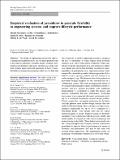Empirical evaluation of procedures to generate flexibility in engineering systems and improve lifecycle performance
Author(s)
Cardin, Michel-Alexandre; Kolfschoten, Gwendolyn L.; Frey, Daniel; de Neufville, Richard L; De Weck, Olivier L; Geltner, David M; ... Show more Show less
Download163_2012_Article_145.pdf (705.6Kb)
OPEN_ACCESS_POLICY
Open Access Policy
Creative Commons Attribution-Noncommercial-Share Alike
Terms of use
Metadata
Show full item recordAbstract
The design of engineering systems like airports, communication infrastructures, and real estate projects today is growing in complexity. Designers need to consider socio-technical uncertainties, intricacies, and processes in the long-term strategic deployment and operations of these systems. Flexibility in engineering design provides ways to deal with this complexity. It enables engineering systems to change in the face of uncertainty to reduce impacts from downside scenarios (e.g., unfavorable market conditions) while capitalizing on upside opportunities (e.g., new technology). Many case studies have shown that flexibility can improve anticipated lifecycle performance (e.g., expected economic value) compared to current design and evaluation approaches. It is a difficult process requiring guidance and must be done at an early conceptual stage. The literature offers little guidance on procedures helping designers do this systematically in a collaborative context. This study investigated the effects of two educational training procedures on flexibility (current vs. explicit) and two ideation procedures (free undirected brainstorming vs. prompting) to guide this process and improve anticipated lifecycle performance. Controlled experiments were conducted with ninety participants working on a simplified engineering systems design problem. Results suggest that a prompting mechanism for flexibility can help generate more flexible design concepts than free undirected brainstorming. These concepts can improve performance significantly (by up to 36 %) compared to a benchmark design—even though users did not expect improved quality of results. Explicit training on flexibility can improve user satisfaction with the process, results, and results quality in comparison with current engineering and design training on flexibility. These findings give insights into the crafting and application of simple, intuitive, and efficient procedures to improve lifecycle performance by means of flexibility and performance that may be left aside with existing design approaches. The experimental results are promising toward further evaluation in a real-world setting.
Date issued
2012-10Department
Massachusetts Institute of Technology. Department of Aeronautics and Astronautics; Massachusetts Institute of Technology. Department of Mechanical Engineering; Massachusetts Institute of Technology. Department of Urban Studies and Planning; Massachusetts Institute of Technology. Engineering Systems DivisionJournal
Research in Engineering Design
Publisher
Springer London
Citation
Cardin, Michel-Alexandre, Gwendolyn L. Kolfschoten, Daniel D. Frey, Richard de Neufville, Olivier L. de Weck, and David M. Geltner. “Empirical Evaluation of Procedures to Generate Flexibility in Engineering Systems and Improve Lifecycle Performance.” Research in Engineering Design 24, no. 3 (October 13, 2012): 277–295.
Version: Author's final manuscript
ISSN
0934-9839
1435-6066